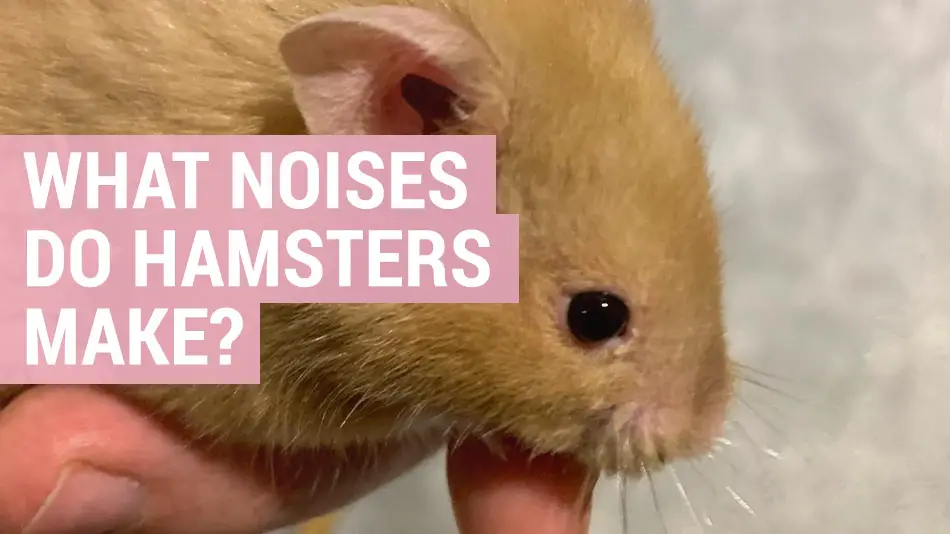What types of noise does a hamster make?
Most animals have a distinct sound that they make. Dogs bark, cats meow, cows moo but what noises can a hamster make and what do they mean?
The most common noises that a hamster makes is to squeak, squeal, hiss or grind their teeth, all of which indicate that your hamster is frightened, agitated or startled. Whilst a hamster in distress is even capable of letting out a high pitched scream.
We all know that hamsters are anything but quiet – especially at night when they are burning off energy, but on the whole our hamster Oscar is pretty discreet. The only times we have ever heard his voice was in the early days of ownership and handling when on the odd occasion he let out a little squeak. But is this normal, or are hamsters meant to make noise?
How do hamsters show their emotions?
Studies have shown that hamsters have emotions and will experience intense feelings just like you and me. However, as they are unable to verbalize them as humans might, they have to find an alternative way to express them.
This can be as simple as twitching their whiskers to let you know they are feeling inquisitive or freezing in place to show you that they are scared; however, they do also use an auditory form of communication too.
What do hamster noises mean?
The most common sounds that your hamster will emit are squeaks, squeals and screams although they may also grind their teeth and hiss. In order to interpret these sounds correctly, you need to analyze what your hamster is doing whilst making the noise. Hamsters are unique, so whilst one hamster may squeal in delight, another may do it out of fright.
In general, however, hamsters make noise to let us know that they are scared, angry or in pain.
Squeaks and squeals – A little squeak can sound adorable, but in fact it could be your hamster’s way of alerting you to something more sinister. The occasional squeak, however, should not be any cause for concern as it is just your hamster’s way of trying to let you know how they feel.
Oscar has only squeaked a handful of times, but on each occasion, it was in direct response to being picked up too roughly or feeling frightened in insecure hands. This behavior soon stopped once he was tamed and used to us.
Hamsters may also squeak and squeal when they are fighting for dominance. If you have a couple of Dwarf hamsters housed together then you should keep a watchful eye out to ensure that they are getting along ok.
Screams – Very rarely you might hear a hamster scream. It is loud and unnerving but essentially born out of fear. It is your hamster’s way of letting you know that they are petrified and need more time to get to know you and their environment better.
Hissing – Hamsters can be aggressive, but just like cats they will often give off warning signals beforehand. If your hamster does not want to be touched or cuddled then it may try to hide or flee, show its teeth or crouch down low. But if persistent hands keep hounding it down, it may retaliate with a hiss. But be warned, because a hiss, invariably leads to a nip.
Grinding of teeth – This chattering sound generally means that your hamster is irritated and wants to be left alone. By baring their teeth and grinding them they are giving a visual and oral warning, generally before they plan to attack.
Happy hamster sounds
A happy, healthy hamster might show their appreciation by letting off some short, shrill squeaks of excitement. They also create a clicking noise, known as bruxing, which is when they rub their lower and upper teeth together. This is often a ritual they partake in when they are feeling calm and content.
What does it mean when your hamster coughs or sneezes?
Hamsters sneeze and cough for the same reasons that we do. They may be irritated by something like dust or a strong smell, which can cause them to cough or sneeze intermittently.
Alternatively, persistent coughing and sneezing combined with a runny nose and eyes can indicate that your hamster has an allergy to things such as food, chemicals in the air or items within their cage. If it is causing them serious health problems, then you should seek veterinary advice.
Hamsters can get colds and catch these from their owners. Therefore, if you are suffering with a seasonal cold or flu it is always best to limit handling your hamster to a minimum and always remember to wash your hands before (and after) picking them up.
Conclusion
For the majority of the time, hamsters are quiet, unobtrusive pets, that really only let us know of their presence when they are gnawing on their bars or running in their wheels. And although they might give off behavioral cues such as jerking, grooming or sniffing, it is unlikely that they will verbalize their feelings.
If, however, your hamster does squeak, squeal, scream or hiss then you must not ignore the message that they are trying to convey. Instead, give them added reassurance and space to make them feel happy and content in their home.


